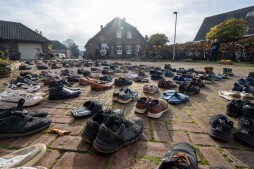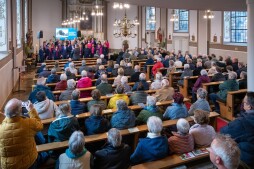
© Joop van Reeken
250 pairs of men's shoes symbolise the accommodation of 250 Rotterdam forced labourers
© Joop van Reeken
The choir "Vision" from Suderwick and Dinxperlo sings in the Michaels Church in SuderwickCommemoration of "Rotterdam forced labourers in Suderwick"
"Razzia of Rotterdam" marks the 80th anniversary
250 pairs of men's shoes stand in pairs in front of St Michael's Church. They symbolise the accommodation of 250 forced labourers from Rotterdam in Suderwick 80 years ago. A cross-border memorial service for the deported men and boys from Rotterdam has now taken place for the first time. The service was accompanied by music from the "Vision" choir, which works across borders in Suderwick and Dinxperlo. Hildegard Schröer-Martini from Suderwick led the service.
During the "Razzia of Rotterdam on 10 and 11 November 1944", around 52,000 men and boys aged between 17 and 40 were arrested by the German Wehrmacht and deported to Germany for forced labour. 250 of them were housed in Suderwick in the halls "Stolte" and "ter Stegge".
Family history from Rotterdam
Anton Stapelkamp, mayor of the neighbouring Dutch municipality of Aalten, reported on his family history as a native of Rotterdam. His father and grandfather witnessed the raid. On 10 and 11 November 1944, soldiers drummed on every door and led boys and men to central assembly points. From there, they travelled to Germany on foot, by ship or by train. The 250 forced labourers from Rotterdam arrived in Bocholt by train and had to walk to Suderwick.
Impressive documentation on the Rotterdam roundup
During the service, Willem Geven from Dinxperlo showed his impressive documentary about this raid and its effects in Suderwick and Dinxperlo. Using photos and texts, the visitors were able to understand the courageous commitment of Dinxperlo residents and some Suderwick residents to the forced labourers in Suderwick. The boys and men had to perform forced labour in the Marl-Hüls labour camp and also in the Bocholt city forest camp. It was also described how the forced labourers were helped in the Rees labour camp. All 250 forced labourers from Suderwick survived.
Thanks to the organisers
The documentary sheds light on the impact on the victims and the villagers on both sides of the border. It was created to show that courageous people helped the forced labourers in their great suffering or even made it possible for them to escape. They did this even though they were threatened with punishment or had to fear for their lives.
History brought to light
The chairman of the Suderwick local history association, Johannes Hoven, together with other Suderwick and Dinxperlo citizens, has brought this almost forgotten part of local history to light by organising the current commemoration. Our thanks therefore go not only to the organisers of the service, but also to all those who contributed to the creation of the documentation. This applies in particular to the contemporary witnesses and their families who shared their stories in this way. Their willingness to talk about this difficult time is invaluable.
Those interested can find the history of the Rotterdam forced labourers in Suderwick and the documentation described here: https://www.heimatvereinsuderwick.de/unterbringung-von-250-rotterdamer-zwangsarbeitern-in-suderwick-vor-80-jahren/


